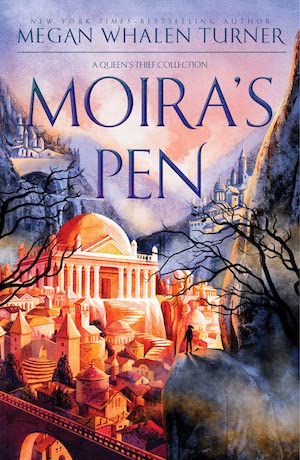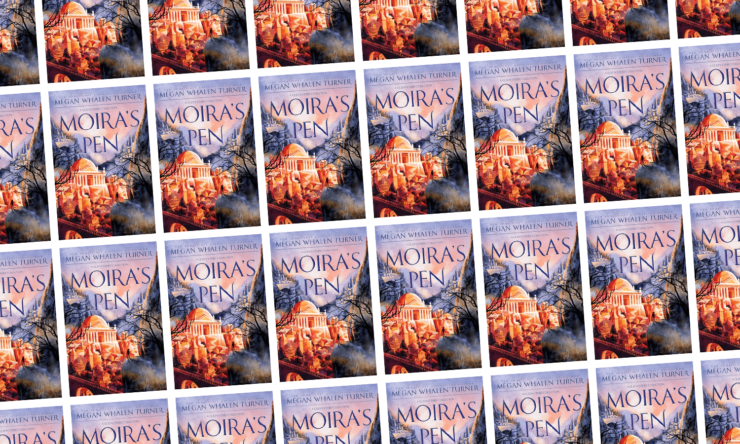Hey, remember that time that Megan Whalen Turner concluded her Queen’s Thief series with Return of the Thief’s audaciously happy ending and I wrote a whole piece about challenging my biases about how epic fantasy series are supposed to end? It was a fitting close to an era, of both reading this series for twenty-five years and of my own writing about it. And then two years later, what does Turner do but release a completely unexpected, seemingly unnecessary, poignantly perfect coda in her new short story collection Moira’s Pen.
She got us again.
Spoilers for Moira’s Pen and the Queen’s Thief series
Here’s where I confess that I’ve never felt compelled to seek out short stories set in even my favorite SFF worlds. Not because I have anything against short fiction! I grew up reading Asimov’s and the annual Best American SFF anthologies, delighting in these brief introductions to a wider range of writers and in how much they could pack into (while stretching the bounds of) a story.
But it’s a weird disconnect when it comes to tales set in a larger SFF world, the existence of which has always struck me as oddly disconnected instead of an extension. It’s an out-of-sight-out-of-mind thing for me; if the pieces are published separately in magazines or included in the back of certain editions but not others, my brain clocks them as untethered from the core work and therefore not necessary to read.
Buy the Book


Moira’s Pen
I can’t trace a starting point for this bias, but it probably had something to do with fanfiction, which I discovered in parallel with my childhood and adolescent fandoms. The moment I finished a fantasy novel or an episode of sci-fi television, there were supplementary stories to be found on LiveJournal and FanFiction.net or on fan forums. In my mind, then, I already had an outlet for slice-of-life stories that dipped back into a beloved world, for missing scenes and character studies. Obviously I could differentiate between the author who created the canon and the readers who conjured up fanworks for one another or for themselves. But as far as I could tell (twenty-odd years ago, as a preteen with more ready access to the Internet than the short story collections I received at Christmas), there were far fewer published authors who returned to play in their own sandboxes for brief forays than there were fan writers constantly writing ficlets.
With that in mind, I opened Moira’s Pen with some reluctance that this might finally be a Queen’s Thief work that I didn’t automatically love—forgetting, of course, that I went through this with A Conspiracy of Kings and Thick as Thieves—and was immediately struck by Turner’s choice to have Moira speak to her. That is, for the muse herself to break the fourth wall of these pages and openly engage the author about her intentions in putting out this collection. Turner explains that their exchange is possible because she is “engaging in fiction,” but as always in the Geniad, there are two meanings to a statement: Yes, Turner is engaging a fictional character in conversation… but she has also just set the example for us, the reader, to engage in the fiction itself. Or, as Turner says in the more traditional letters to readers on the next page, “to abandon the narrative track and go exploring in my own world.”
As with any collection, not all of the stories land. But what’s excellent is how many of the three dozen offerings are microfiction, so that a brief visit to the perspective of a minor character who may not be your particular favorite is over within a few pages, and you always learn something new.
To wit, I had to ease myself into reading the opening story of the collection, “Eddis Goes Camping,” due to my own hesitation to follow a child narrator—here, young Helen, who will receive the unexpected prophecy of her unique name while warming herself at the campfire of the gods. Yet it sets a strong tone for the collection, giving us a throughline not of Eugenides the Queen’s Thief, but of his Queen—his first Queen—this ruler who for so much of her life is underestimated. She’s not as beautiful as Attolia nor as cunning as Attolis nor as sweet as Sounis, but she is the one who has the vision of the Sacred Mountain erupting.
Like Gen, Eddis’ mortal life dances on a path that often steers her into the company of the divine, even as she represents more of the Everywoman (despite her royal upbringing). It makes perfect sense, then, that “The End of Eddis” bookends her lifetime as laid out in these pages; despite Eddis being an old woman when she encounters the gods again, it mirrors her night with them in childhood. Because to the immortals, all mortals are children regardless of age or the span of their lifetimes. And there is the satisfaction of seeing the Sacred Mountain’s eruption come to pass, transforming the Lesser Peninsula the way that Eddis always knew it would (and worked to save her people and her family from).
Of course, that’s not the actual end of Moira’s Pen. But we’ll get to that.
Because I love our boy Gen most of all, the stories that really sank their hooks into me feature glimpses of him at different points in this life. “The Destruction of Hamiathes’ Gift” is basically just a missing scene between The Thief and The Queen of Attolia, yet it answers so many lingering questions that were not addressed in The Queen of Attolia, especially as that book immediately broke our hearts.
Approaching one of my favorite narrative tropes (watching someone’s secret identity get revealed) in parallel ways, “Wineshop” and “The Cook and the King of Attolia” examined two sides of Gen’s struggle with trading his infamy as the Thief for his very public standing as Attolia’s bridegroom, and perhaps explains why he went to such lengths to craft an external persona that was so false. The latter especially could have come out too heavy-handed (or, dare I say, Gary Stu-ish) with a less subtle writer, but it hits the perfect note of familiarity by having the cook recognize the version of Gen that by that time we have sorely missed.
And I should have guessed that reading the entirety of “The River Knows” would make the tears come slipping down in sympathy and catharsis for Gen and Irene’s loss long before the birth of their twins at the end of Return of the Thief. It didn’t need to be there (I remember the gist of it being mentioned in The King of Attolia), but after reading it, I can’t imagine the collection without it.
Not all of the stories are written: Sprinkled throughout the book are illustrations, fantastically rendered by Deena So’Oteh, mostly of jewelry from the series. So much of the books’ plots, and Eugenides’ personal arc, revolves around a specific pair of earrings—whether stolen and offered up at the temple, wielded as secret marriage proposal, or otherwise linking two unlikely lovers—that it’s such a treat to get to analyze their every detail and facet. Even though they’re scattered throughout this collection, they command the same attention as if the reader were walking through a museum exhibition and examining each one, presented on display with an accompanying info card.
Presented in this way, The Queen’s Thief never technically has to end; it can be revisited like a beloved permanent collection, each return steering the reader (or its creator) into an unexpected new corner of discovery. And that could have been enough to justify Moira’s Pen… but then Turner wraps it all up into a new context that completely subverts our entire reading experience up until now.
Once more, Turner subverts who we think is telling the story—but in this case, it’s challenging our assumptions about who is reading. See, we thought it was just our eyes on these pages, but it turns out that we’ve been reading alongside none other than Gitta Kingsdottir. Sharp-eyed readers noted that the fantastic map in Return of the Thief is an in-universe creation, drawn up for this person, but now we actually get to meet the girl in the final story, “Gitta.”
As we might have guessed from the naming convention, she is not from the Lesser Peninsula, but rather the land of Brael. What she has been reading is one of the Books of Pheris, whose writings made up Return of the Thief and who has clearly continued to document the lifespan of Eugenides the Great (who else snickered?) in an epic for future princesses to be tutored in.
But Gitta is no random princess, though she is a stranger to Ephestalia, the single country that combines Eddis, Sounis, and Attolia. Turner packs so much into these last few pages that it made my head spin, and I had to reread. Gitta is being married off to a crown prince in a foreign country—but it’s less of an exile and more of a homecoming. Her great-grandmother Eugenia fled with Pheris after her brother Hector disappeared, both losing their destined roles as king and Thief. Pheris became known as the Princess Thief (now that’s a book title!), and they disappeared into the land and customs and royal line of Brael.
It’s a missing scene and a genealogy and a character study and yes, of course, I was screaming at this point.
And then there’s the last little twist: that the Eugenides that Gitta has known this whole time is more Attolis than anything else, portrayed by historians as “dignified” (read: boring) instead of as the rascal that Pheris actually observed and served and loved. The only version of Gen that Gitta was meant to know was necessarily held at a distance—until now. Because now the truth comes out, that Gitta is his blood, she was supposed to be named after him, and she will return to actually walk in the footsteps of him and Attolia and Eddis and Sounis, of queens and kings and Thieves.
Moira’s Pen isn’t an epilogue; if anything, it’s more of a prologue, a potential new beginning—whether for novels or stories, it’s too soon to say. But I’m so excited that the path has been revealed.
Moira’s Pen is published by Greenwillow Books.
Case in point, Natalie Zutter now wishes she had read Tamsyn Muir’s “As Yet Unsent” before Nona the Ninth, but that’s a lesson for next time. Tell her about your favorite in-universe short fiction on Twitter!










